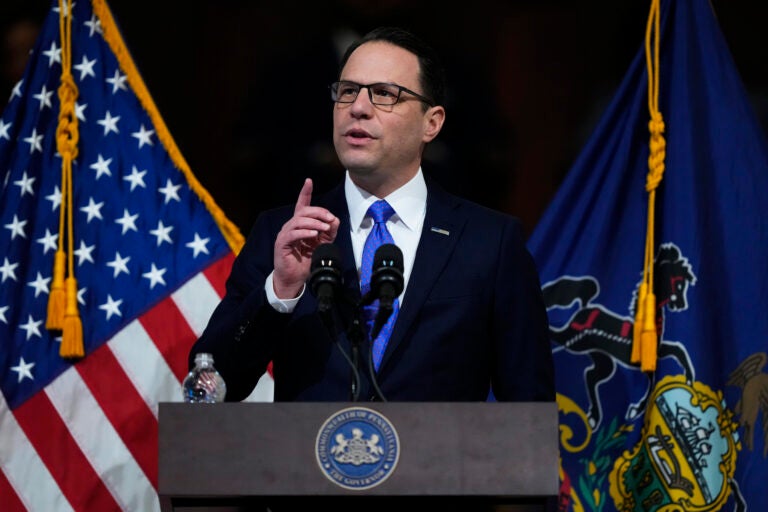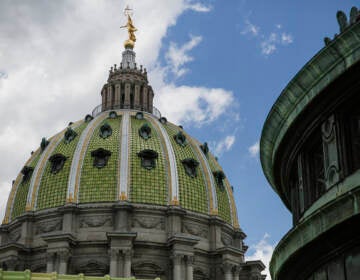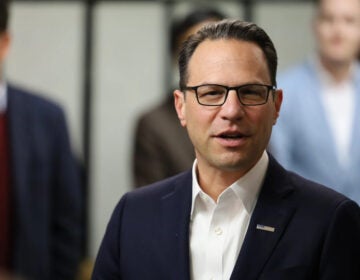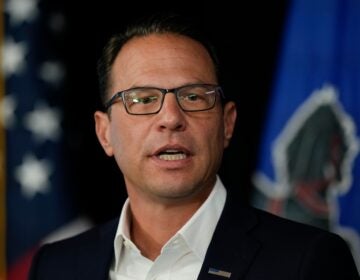Gov. Shapiro, Pa. legislators seek compromise on public education funding
Pennsylvania’s Commonwealth Court ruled that the state’s public education funding formula was inequitable and unconstitutional, requiring change.

Gov. Josh Shapiro delivers his budget address for the 2024-25 fiscal year to a joint session of the Pennsylvania House and Senate in the Rotunda of the state Capitol in Harrisburg, Pa., Wednesday, Feb. 6, 2024. (AP Photo/Matt Rourke)
From Philly and the Pa. suburbs to South Jersey and Delaware, what would you like WHYY News to cover? Let us know!
Ahead of the June 30 deadline to finalize the $48 billion state budget, legislators on both sides of the aisle are pushing their priorities for a deal that will change the way Pennsylvania funds public education.
The pending change comes after the Commonwealth Court ruled in 2023 that the state’s public education funding formula was inequitable and unconstitutional and directed Gov. Josh Shapiro and the state Legislature to resolve the problem.
The governor responded in February with a record budget proposal of a $1.1 billion hike in basic education funds. That includes about $242 million for the Philadelphia School District.
Legislators will continue to negotiate to ultimately reach a compromise on a budget for the governor to sign by the end of the month.
On June 9, the Democratic-controlled House passed legislation that reduced the amount of money to cyber charter schools and changed the funding formula for public schools.
For example, the legislation returns about $1 billion in real estate taxes to Pennsylvania residents. In addition, the reform of cyber charter school funding will save about $530 million a year.
Speaker of the House Joanna McClinton, D-Philadelphia, told WHYY News the cyber charter funding rules need an overhaul.
“Currently, cyber charters are permitted to accumulate hundreds of millions of dollars in assets that they then use to buy advertising and gift cards to attract students, while the school districts that fund cybers are forced to raise local taxes,” McClinton said.
The measure passed by the House is “a comprehensive plan that will correct inequalities related to cyber charters, but also would inject billions of dollars into Pennsylvania’s chronically underfunded schools, offer property tax relief in communities that have shouldered too much of the burden, and will help us begin to meet our constitutional mandate to adequately and equitably fund public schools,” she added.
Sean Vereen, president of Heights Philadelphia, a nonprofit education advocacy group, described the legislation as a good down payment.
“Ultimately, it goes in the right direction.” Vereen said. “It’s going to put more resources into the hands of schools. There is going to be more work that’s going to have to be done over the next 5–10 years to get this to a place that it needs to be. We should not be at the bottom of the list of states in [education] spending.”
Under the legislation, most school districts in the state will receive more funding.
The bill now goes to the Republican-controlled Senate.
Most Republicans voted against the measure, which passed 107-94. State Rep. Robert Leadbeter, R-Columbia County, and others in his party said they wanted more focus on reforming public schools instead of just increasing funding.
As an indication of how much is at stake for the city, Philadelphia Mayor Cherelle Parker, City Council President Kenyatta Johnson and several education stakeholders, including Philadelphia School District Superintendent Tony Watlington Sr. and Community College of Philadelphia President Guy Generals, wrote a letter to Shapiro and the General Assembly urging them to fully fund the adequacy gap established by the Basic Education Funding Commission.
“The General Assembly has an opportunity this year to end the system of education that has denied students across the commonwealth, and here in Philadelphia, their fundamental right to an education that prepares them to succeed,” the letter stated.
According to the letter, the city contributes more than $1.8 billion in local taxes to support education.
On the Republican side, legislators in the Senate are reviving voucher legislation, known as the Pennsylvania Award for Student Success program (PASS) that would provide $100 million of taxpayer money for private school tuition for students in the state’s lowest performing public schools.
Last year, Shapiro, who supports PASS, vetoed the legislation to break a stalemate in the previous budget session, when Democrats in the House refused to fold.
Critics include the Philadelphia School District and the PFT, who say PASS would siphon money from an already underfunded public school system. Most Democrats, other than state Sen. Anthony Williams, D-Philadelphia, also oppose PASS.
Despite the opposition, hip-hop mogul Jay-Z is funding information sessions in Philadelphia supporting the PASS program, which has been championed by billionaire Jeff Yass, a major Republican political contributor, who has spent millions of dollars promoting it.
Vereen, president of Heights, said private schools have no obligation to accept any student with a voucher.
“Even when voucher systems are in place, the best choices are determined by class and race,” Vereen said. “We need to create more options in the public schools, but we have to focus on quality.”
Earlier this month, state Rep. Elizabeth Fiedler, D-Philadelphia, led a delegation to Dobbins Technical High School in North Philadelphia, one of two schools being considered for installation of solar panels, along with Mayfair Elementary.
Fielder has introduced legislation known as Solar for Schools that would mean financial savings in energy costs and investment into clean energy. State Reps. Donna Bullock, D-Philadelphia, and Jared Solomon, D-Philadelphia, accompanied Fielder, along with representatives of the Philadelphia Energy Authority and the governor’s Office of Strategic Initiatives.
Gov. Shapiro helped serve breakfast at George W. Childs Elementary School in South Philadelphia June 7 to highlight the record $1.1 billion hike in education funds in his 2024–25 budget, which includes money for free breakfast for all 1.7 million public school students.
“From delivering the largest increase in K–12 basic education funding in Pennsylvania history to securing universal free breakfast for 1.7 million K–12 students,” Shapiro said, “we are giving every student the tools they need to succeed.”
Editor’s note: A previous version of this story misstated state Rep. Elizabeth Fielder’s district. It has since been corrected.

Get daily updates from WHYY News!
WHYY is your source for fact-based, in-depth journalism and information. As a nonprofit organization, we rely on financial support from readers like you. Please give today.








